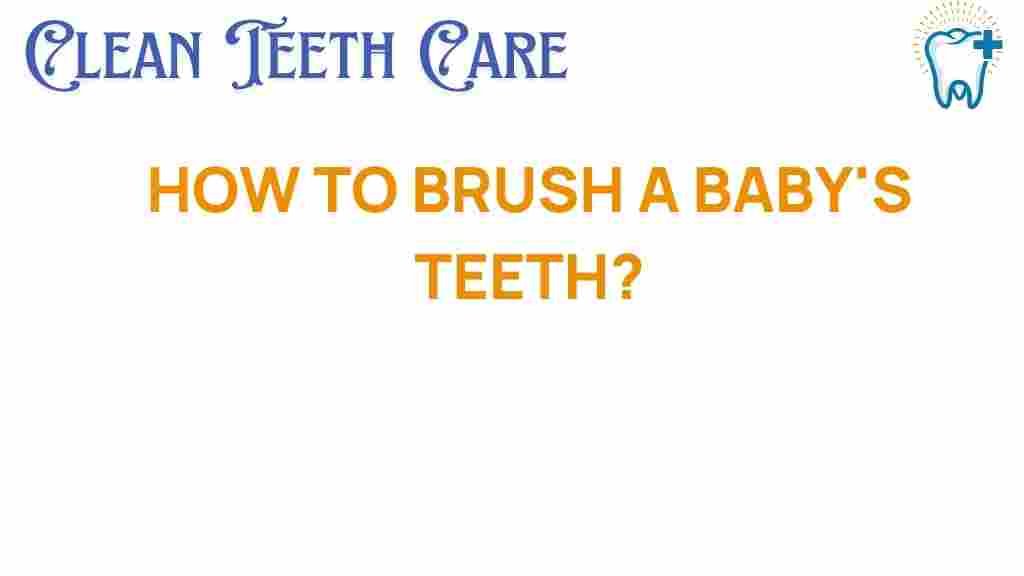Mastering the Art of Baby Toothbrushing: Essential Tips for Parents
As a new parent, ensuring your child’s oral hygiene is likely one of your top priorities. With the arrival of those precious first teeth, understanding the importance of baby toothbrushing becomes crucial. Starting a solid foundation for infant dental health is essential for your baby’s overall well-being. This guide provides you with essential parenting tips and effective brushing techniques to help you master the art of baby toothbrushing.
Understanding the Importance of Baby Toothbrushing
Many parents may underestimate the significance of baby toothbrushing. However, establishing a routine early on can lead to lifelong healthy habits. Here are some reasons why dental care for your baby is vital:
- Prevents cavities and tooth decay.
- Encourages healthy eating habits.
- Promotes good oral hygiene that can last a lifetime.
- Helps your child become accustomed to dental visits.
By starting early, you equip your child with the knowledge and practices needed for maintaining oral hygiene as they grow.
Step-by-Step Process to Start Baby Toothbrushing
Now that you understand the importance, here’s a step-by-step process to help you with baby toothbrushing:
1. Gather Your Supplies
Before you begin, ensure you have the right tools:
- A soft-bristled toothbrush designed for infants.
- Fluoride-free toothpaste (if your baby is over six months old).
- A clean, damp cloth for initial cleaning.
2. Timing is Key
The best time to start baby toothbrushing is when your baby’s first teeth emerge, usually around six months of age. Establish a routine, ideally brushing twice a day – once in the morning and once before bed.
3. Positioning Your Baby
Find a comfortable and secure position for both you and your baby. You can try:
- Holding your baby in your lap while seated.
- Laying your baby on a clean, flat surface.
This helps you gain better access to your baby’s mouth.
4. Get Them Used to the Toothbrush
Before using the toothbrush, let your baby explore it. This will help them become familiar with the tool and reduce anxiety.
5. Brush Gently
When you start brushing:
- Use a small amount of toothpaste (about the size of a rice grain).
- Gently brush the front and back of each tooth.
- Brush in a circular motion, being careful around the gums.
Even if your baby has only a few teeth, brushing is essential for removing plaque and food particles.
6. Make it Fun
Turn baby toothbrushing into a fun activity. Sing songs, play games, or let your baby pick out their toothbrush. This makes the experience enjoyable and encourages them to participate.
7. Encourage Spitting, Not Swallowing
As your child grows and starts using toothpaste, teach them to spit out the excess instead of swallowing it. This is an important part of maintaining good oral hygiene.
8. Regular Dental Check-ups
It’s crucial to schedule regular dental check-ups starting at the age of one. This helps in monitoring your child’s infant dental health and addressing any concerns early on.
Troubleshooting Baby Toothbrushing Challenges
Many parents encounter challenges during baby toothbrushing. Here are some common issues and how to tackle them:
1. Resistance to Brushing
If your baby resists brushing, try:
- Brushing while they are in the bath, where they may feel more relaxed.
- Using a toothbrush with their favorite character to make it appealing.
- Allowing them to hold the toothbrush and mimic your actions.
2. Crying or Fussing
If your baby cries during brushing, stay calm and reassuring. Try to:
- Brush while they are distracted by a toy or a song.
- Limit brushing time to just a few seconds at first and gradually increase as they get used to the routine.
3. Sensitive Gums
Teething can cause sensitivity. If you notice discomfort, try:
- Using a teething gel before brushing.
- Brushing with a damp cloth instead of a toothbrush.
Building Healthy Habits for Life
Establishing a baby toothbrushing routine early on lays the groundwork for lifelong healthy habits. Here are some additional tips to help foster good oral hygiene:
- Limit sugary foods and drinks to reduce the risk of cavities.
- Encourage drinking water, especially after meals.
- Model good dental care by brushing your teeth alongside your child.
- Teach them the importance of visiting the dentist regularly.
By integrating these practices into your daily life, you empower your child to take charge of their oral hygiene as they grow.
Conclusion
Mastering the art of baby toothbrushing is an essential skill for parents committed to their child’s oral hygiene. With patience, creativity, and consistency, you can turn this task into a positive experience for both you and your baby. Remember that establishing good dental care habits early on not only supports healthy baby teeth but also sets the stage for a lifetime of excellent infant dental health.
For more information on parenting tips and healthy habits, check out this helpful resource. And if you’re looking for expert advice on dental care, visit your local pediatric dentist or explore more at this external site.
This article is in the category Kids and created by CleanTeethCare Team
